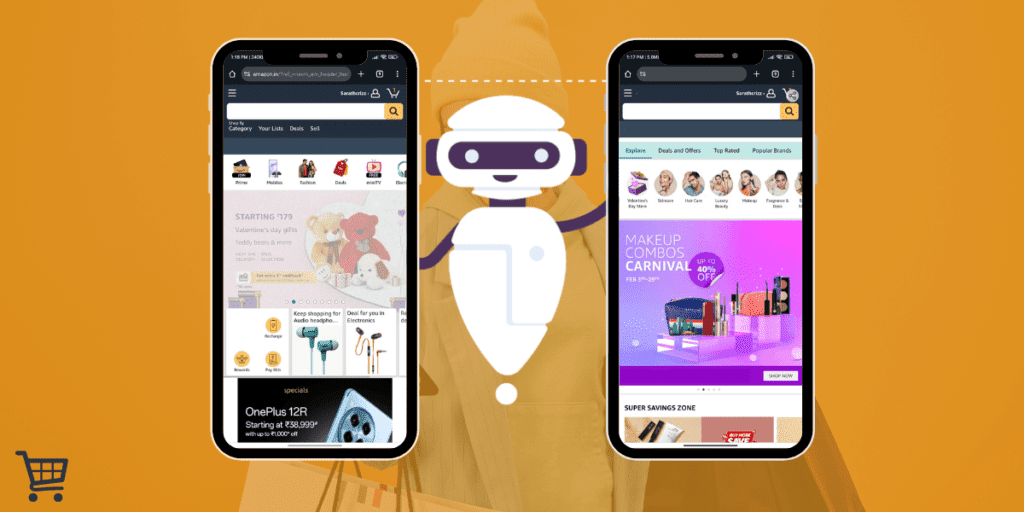Amazon, a behemoth in the digital retail space, has again positioned itself at the forefront of this technological revolution by introducing Rufus, an AI-powered shopping assistant designed to redefine how consumers discover and select products online.
Launched in February 2024, Rufus represents Amazon’s latest foray into AI-driven services, promising to offer personalized shopping assistance by leveraging the vast data from Amazon’s catalog, customer reviews, community Q&As, and information from across the web.
Rufus aims to simplify the shopping process for users by providing tailored product recommendations and detailed comparisons in response to specific search queries.
This initiative highlights Amazon’s commitment to enhancing user experience through innovation and raises questions about the implications of such technologies on consumer choice, competition, and the broader retail ecosystem.
As we delve into the functionalities and strategic significance of Rufus, it becomes clear that this tool is not just a convenience feature for shoppers but also a strategic move by Amazon to cement its dominance in online retail, potentially reshaping the dynamics of product search and discovery in the digital age.
What is Rufus?
Rufus is Amazon’s newly introduced AI-powered shopping assistant, positioned to transform the online shopping experience for users across the United States.
Designed as an intelligent chatbot, Rufus integrates seamlessly within the Amazon Shopping app, offering a beta version initially to a select group of users, with plans for a broader rollout in the weeks following its launch in February 2024.
This innovative tool is crafted to navigate Amazon’s extensive catalog, utilizing data from customer reviews, community Q&As on product pages, and a broad spectrum of information sourced from across the web to assist shoppers.
The core functionality of Rufus lies in its ability to provide personalized product recommendations and detailed comparisons in response to specific, search-driven queries.
Unlike traditional search methods that often yield broad, generalized results, Rufus is engineered to understand and process nuanced questions like the differences between trail and road running shoes or what factors to consider when purchasing running shoes. By doing so, Rufus aims to bridge the gap between the vastness of Amazon’s product offerings and each shopper’s specific needs and preferences.
Rufus can guide users to products that best fit their specific needs, whether they are searching for a new toaster oven or the perfect dinosaur toy for a child. The AI tool can provide side-by-side comparisons of products based on features, prices, and customer reviews, helping users make informed decisions.
Rufus excels in answering detailed questions that customers might typically direct to a search engine, offering precise and relevant product insights directly within Amazon’s platform.
The tool also supports queries related to shopping for specific occasions, such as parties or sports events, and can recommend products suited for particular individuals or purposes.
Consumer Benefits
The introduction of Amazon’s AI-powered shopping assistant, Rufus, brings a suite of benefits directly to the doorstep of the modern shopper.
By harnessing the power of personalized shopping assistance, Rufus offers tailored recommendations that align closely with individual queries and preferences, significantly enhancing the personalization of the shopping experience.
This level of customization saves time by streamlining the search process and empowers consumers with the information needed to make more informed purchasing decisions.
Rufus accomplishes this by drawing from an extensive database of Amazon’s catalog, customer reviews, and wide-ranging web information, providing shoppers with a comprehensive understanding of the products they’re interested in.
Rufus simplifies the shopping experience for specific needs, whether finding the perfect gift for an occasion, selecting the best product for a particular person, or catering to a unique purpose.
This innovative tool significantly improves consumers’ ability to navigate Amazon’s vast inventory, making it easier to discover and explore products that might have been overlooked through traditional search methods.

Amazon’s Strategic Advantages
The launch of Rufus by Amazon marks a strategic advancement in e-commerce, highlighting the company’s commitment to integrating cutting-edge AI technology to redefine the shopping experience.
This strategic move is about enhancing user convenience and consolidating Amazon’s dominance in the online retail sector. By offering personalized, AI-driven shopping assistance through Rufus, Amazon aims to further entrench its position as the go-to platform for product searches, potentially shifting traffic away from traditional search engines like Google.
This signifies a deliberate effort to capture a larger share of the product discovery and decision-making process, keeping consumers within the Amazon ecosystem from the outset of their shopping journey.
Rufus could serve as a tool for Amazon to monetize its platform more effectively by prioritizing products that yield higher profits or are sponsored by advertisers. However, this raises questions regarding consumer choice and fairness.
The introduction of Rufus also reflects Amazon’s broader strategy to stay at the forefront of technological innovation in retail, setting a benchmark for competitors and reshaping consumer expectations around online shopping.
Concerns and Criticisms
Amazon’s AI-powered shopping assistant heralds a new era of convenience and personalized shopping; it also raises several concerns and criticisms. Central to these is the apprehension regarding how Rufus might influence consumer choice and market fairness.
Given Amazon’s history and the Federal Trade Commission’s pending 2023 antitrust lawsuit against the company, there’s scepticism about whether Rufus could steer customers towards products that are more profitable for Amazon or those backed by advertising dollars, potentially at the expense of consumer interests and smaller vendors.
This manipulation of product visibility could undermine the principle of a level playing field in the e-commerce domain, disadvantaging competitors and limiting genuine consumer choices.
There’s worry about the transparency of Rufus’s recommendation algorithms and whether shoppers can truly trust the impartiality of the assistance provided.
These concerns underscore the broader implications of deploying AI in retail environments, touching on trust, data privacy, and the monopolization of marketplaces.
As such, Rufus’s deployment invites scrutiny of Amazon’s practices and the ethical considerations surrounding AI’s role in shaping consumer behaviors and market dynamics.
Other AI Shopping Assistants
The introduction of Amazon’s Rufus into the AI shopping assistant landscape signifies a notable development. Yet, it’s essential to contextualize its features and capabilities compared to similar technologies deployed by other tech giants and retail leaders.
Google and Walmart, for instance, have also ventured into the realm of AI-driven shopping enhancements, each with unique offerings aimed at enriching the consumer shopping experience.
Google’s AI image generator and virtual try-on tool represent innovative approaches to product discovery and visualization, enabling users to search for products more effectively and see how these products would look in real life or in specific settings. Walmart’s AI initiatives, on the other hand, focus on personalizing the shopping experience through recommendation engines and chatbots that assist customers in purchasing decisions.
What sets Rufus apart is its deep integration within Amazon’s vast ecosystem, leveraging the company’s extensive product catalog, customer review database, and sophisticated AI technologies to offer a highly personalized and conversational shopping experience.
This direct comparison underscores the competitive landscape of AI shopping assistants, where each platform seeks to leverage its unique strengths—whether it’s Amazon’s extensive e-commerce presence.
Google’s prowess in search and image recognition, or Walmart’s retail expertise—offers distinctive solutions that cater to consumers’ evolving needs and expectations in the digital age.

Final Thoughts
Amazon’s launch of Rufus as an AI-powered shopping assistant marks a significant milestone in the evolution of e-commerce, blending cutting-edge technology with consumer convenience to redefine the online shopping experience.
Rufus is a testament to Amazon’s relentless pursuit of innovation, aiming to personalize the shopping journey and streamline the product discovery process.
This advancement has concerns and criticisms, particularly regarding consumer choice, market fairness, and the potential for biased recommendations.
The introduction of Rufus invites us to reflect on the broader implications of AI in retail, balancing the benefits of convenience and personalization against the need for transparency, ethical considerations, and the preservation of a competitive marketplace.
Rufus’s entry into the market highlights the ongoing race among tech giants and retail leaders to leverage AI to enhance customer engagement and satisfaction.
Each company, from Google to Walmart, brings its unique approach to AI-driven shopping assistance, underscoring the diverse strategies employed to capture consumer attention and loyalty.
As we move forward, the landscape of AI shopping assistants will likely continue to evolve, driven by technological advancements and changing consumer expectations.


